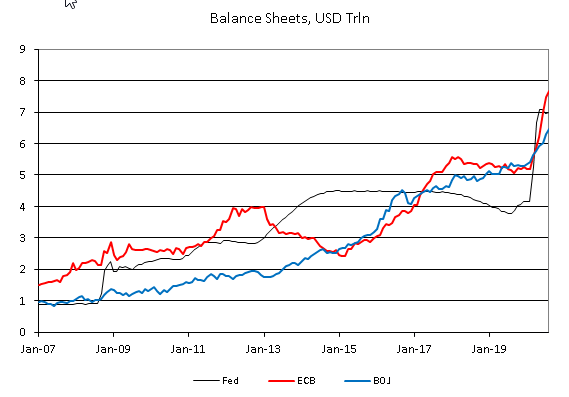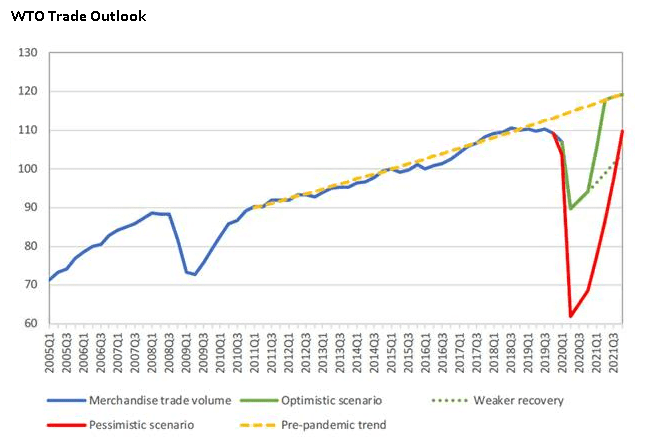The US political outlook has been upended by recent developments; lack of a significant safe haven bid for the dollar so far is telling This is a very quiet week in terms of US data; FOMC minutes will be released Wednesday; there is a full slate of Fed speakers The eurozone has a fairly heavy data week; Brexit talks continue in London; UK has a heavy data week Japan has a fairly heavy data week; RBA meets Tuesday and is expected to keep policy unchanged; that same day, the government releases its budget The US political outlook has been upended by recent developments. President Trump remains in the hospital and conflicting statements from his doctors have only added to the confusion. Post-debate polls suggest President Trump’s support was hurt by his performance.
Topics:
Win Thin considers the following as important: 5.) Brown Brothers Harriman, 5) Global Macro, Articles, developed markets, Featured, newsletter
This could be interesting, too:
Nachrichten Ticker - www.finanzen.ch writes Die Performance der Kryptowährungen in KW 9: Das hat sich bei Bitcoin, Ether & Co. getan
Nachrichten Ticker - www.finanzen.ch writes Wer verbirgt sich hinter der Ethereum-Technologie?
Martin Hartmann writes Eine Analyse nach den Lehren von Milton Friedman
Marc Chandler writes March 2025 Monthly
- The US political outlook has been upended by recent developments; lack of a significant safe haven bid for the dollar so far is telling
- This is a very quiet week in terms of US data; FOMC minutes will be released Wednesday; there is a full slate of Fed speakers
- The eurozone has a fairly heavy data week; Brexit talks continue in London; UK has a heavy data week
- Japan has a fairly heavy data week; RBA meets Tuesday and is expected to keep policy unchanged; that same day, the government releases its budget
![]() The US political outlook has been upended by recent developments. President Trump remains in the hospital and conflicting statements from his doctors have only added to the confusion. Post-debate polls suggest President Trump’s support was hurt by his performance. Now, it remains to be seen how the public reacts to the growing Covid outbreak within his administration and among senior Republican leaders. The betting markets may provide an early signal, with the Real Clear Politics average for a Biden victory rising to an all-time high of 61%.
The US political outlook has been upended by recent developments. President Trump remains in the hospital and conflicting statements from his doctors have only added to the confusion. Post-debate polls suggest President Trump’s support was hurt by his performance. Now, it remains to be seen how the public reacts to the growing Covid outbreak within his administration and among senior Republican leaders. The betting markets may provide an early signal, with the Real Clear Politics average for a Biden victory rising to an all-time high of 61%.
Lack of a significant safe haven bid for the dollar so far is telling. DXY was unable to break above 94 Friday and it suggests that the FX market is pricing in greater odds of a Democratic sweep which many (including us) think would be dollar-negative. Yes, it’s way too early to see how things shake out but this is our early take until proven otherwise. One can also make a case for heightened political uncertainty in the US also weighing on the dollar. Can Congress and the White House strike a stimulus deal in this environment? Simply put, it’s hard to put a dollar-positive spin on any of this news.
AMERICAS
This is a very quiet week in terms of US data. September ISM services PMI Monday is the only top-tier release and it is expected to drop to 56.2 from 56.9 in August. Final Markit services and composite PMIs will also be reported Monday. August trade (-$66.2 bln expected) and JOLTS job openings (6500 expected) will be reported Tuesday, followed by August consumer credit Wednesday ($14.0 bln expected). August wholesale trade sales will be reported Friday.
FOMC minutes will be released Wednesday. The Fed delivered no surprises then but updated the forward guidance to reflect its new policy framework, pledging to keep rates near zero until “inflation has risen to 2% and is on track to moderately exceed 2% for some time.” The phrases “moderately exceed” for “some time” are suitably vague and so it’s not a mechanical Taylor Rule by any stretch. That gives the Fed maximum flexibility while underscoring that rates will stay lower for longer. Minutes should give more insight on the new framework.
There is a full slate of Fed speakers. Evans and Bostic speak Monday, followed by Powell, Harker, Bostic, and Kaplan Tuesday. Rosengren, Bostic, Kashkari, Williams, and Evans all speak Wednesday, while Rosengren and Bostic speak again Thursday.
Weekly jobless claims will be reported Thursday. Initial claims are expected at 820k vs. 837k the previous week, while continuing claims are expected at 11.4 mln vs. 11.767 mln the previous week. Adding regular and PUA initial claims shows about 1.5 mln are still filing for unemployment every week and that’s not so good. Elsewhere, adding regular and PUA continuing claims show that around 24 mln are still collecting benefits. Overall, this still points to a stalled labor market. Friday’s jobs data was on the soft side, with the 661k gain smaller than expected and the drop in the unemployment rate to 7.9% due in large part to lower labor force participation.
Like last week, there will be a quirk to this week’s initial claims data. Last week, California announced a two-week pause in its initial claims processing to clear a backlog and implement fraud prevention technology. California reported the level from the previous week and will do so again this week before revising these numbers after the pause. Some fraudulent claims may be eliminated. However, given the negative impact of the wildfires as well as the potential surge from the backlog, we see upside risks to those revisions.
Canada has a busy week. Highlight will be September jobs data Friday. A gain of 125k is expected, down from 245.8k in August but still strong. Unemployment is seen falling to 9.9% from 10.2% in August. Ahead of that, we get August trade Tuesday, September Ivey PMI Wednesday, and September housing starts Thursday. A second wave of virus infections is hitting the province of Ontario, leading to expanded restrictions in the large urban areas of Ottawa, Toronto, and Peel. This will surely weigh on the economy in Q4 and bears watching.
EUROPE/MIDDLE EAST/AFRICA
The eurozone has a fairly heavy data week. Final September services and composite PMIs will be reported Monday. Spain and Italy are expected to worsen from August and could drag the preliminary composite PMI lower from the preliminary 50.1 reading. August retail sales will also be reported Monday and are expected to rise 2.5% m/m vs. -1.3% in July. Here too we see downside risks based on the country readings so far. Germany reports August factory orders (2.9% m/m expected) Tuesday, followed by IP (1.7% m/m expected) Wednesday and trade and current account data Thursday. Other IP data will be reported, including Spain Wednesday followed by France (1.9% m/m expected) and Italy (1.4% m/m expected) Friday. Eurozone aggregate IP for August will be reported next Wednesday.
Brexit talks will continue in London. Over the weekend, UK Prime Minister Johnson and EC President von der Leyen spoke. After the call, the two “instructed their chief negotiators to work intensively in order to try to bridge” the gaps, according to a joint statement, adding that “They agreed on the importance of finding an agreement, if at all possible.” The level playing field and fisheries remain points of contention. Reports suggest Johnson still wants to clinch a deal by October 15, the same day as the EU summit in Brussels. After this week’s talks in London, they will continue next week in Brussels.
UK has a heavy data week. The bulk will come Friday, when August GDP, IP, construction output, services index, and trade all get reported. GDP is expected to rise 4.6% m/m, while IP is expected to rise 2.6% m/m, construction 5.0% m/m, and services 5.0% m/m. All are slowing down from July. Looking ahead to this fall, a more abrupt deceleration may be seen when many government support programs end. Ahead of that, final September services and composite PMIs will be reported Monday and construction PMI will be reported Tuesday.
ASIA
Japan has a fairly heavy data week. Final September services and composite PMIs will be reported Monday, with both remaining firmly below the 50 boom/bust level. August leading index will be reported Wednesday, followed by August current account data Thursday. Friday brings August real cash earnings and household spending. Earnings are expected to contract -1.4% y/y vs. -1.6% in August, while spending is expected to contract -6.8% y/y vs. -7.6% in August. Overall, the data suggest the economy is improving slightly but still facing strong headwinds. We continue to expect another slug of fiscal stimulus from new Prime Minister Suga in the coming months.
Reserve Bank of Australia meets Tuesday and is expected to keep policy unchanged. A handful of analysts look for a 15 bp cut in both the cash rate and the 3-year yield target to 0.10%. The futures market is more aggressive, with WIRP suggesting nearly two thirds odds of a rate cut then. An aggressive fiscal expansion is expected to be announced by the government. This supports the view that the RBA will hold off from taking any actions this week and letting fiscal policy take the spotlight.
On the same day the RBA meets, the government releases its budget. Reports suggest AUD7.5 bln of infrastructure spending will be brought forward to this year, while income tax cuts due to take effect July 2022 will be backdated to July 2020 and cuts due to take effect in July 2024 will also be brought forward but perhaps not backdated. Note August jobs data were stronger than expected and should have supported consumption, but August retail sales fell -4.0% m/m and suggests there are still downside risks to the economy. August trade will also be reported Tuesday.
Tags: Articles,developed markets,Featured,newsletter






